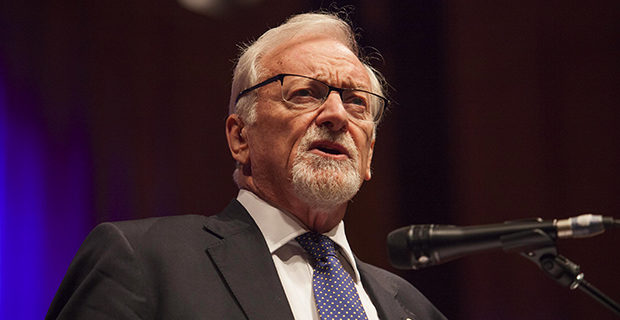Former Labor heavyweight and now ANU chancellor Gareth Evans has used a speech to fellow university leaders to detail ANU’s much publicised struggles with the Ramsay Foundation and call for universities to be vigilant in remaining open to the principles of free speech.
In the inaugural Chancellor’s Oration to the National Conference on University Governance in Adelaide, Evans said that, contrary to the belief of the “army of columnist and editorial writers in the Murdoch press”, ANU was not swayed by a bunch of 'leftie' staff members. According to Evans there were myriad warnings that the Ramsay centre as not the right fit for ANU.
The levels of micromanagement suggested in the memorandum of understanding concerned the ANU negotiators, and even the simple matter of the name of the degree – the ANU suggested the addition of the word “studies” to the degree – could not be agreed upon.
Another “warning bell” for Evans was the apparent threat of the money being pulled after the degree's proposed eight-year term.
“A time-limited gift is not in itself problematic. But building a major program involving the hiring of a dozen new staff, and then being held hostage to its continuation by a donor whose most senior and influential figures appear to have manifestly different views to ours about university autonomy and academic freedom, is not a happy position for any university to be in,” said Evans.
Those “senior and influential figures” include ex-PM and Ramsay Board member Tony Abbott, who raised eyebrows at ANU when in a Quadrant magazine article he said the course should “not merely be about Western civilisation but in favour of it”.
Evans' most strident accusation is in keeping with the accusation regularly thrown ANU’s way: Evans believes it was fundamentally The Ramsay Board’s negligible attitude towards academic freedom that derailed negotiations.
“A draft sentence reading 'The parties to this MOU acknowledge each other’s objectives and their shared commitment to the principles of academic freedom' came back to us with the words 'their shared commitment' struck out and 'ANU’s commitment' substituted!” Evans recalled.
Furthermore, the Ramsay CEO insisted that its representatives be allowed to monitor the ANU’s implementation of the course by sitting in on classes.
Also presenting at the conference, Institute of Public Affairs research fellow Matthew Lesh spoke of his fear that Australian universities are “becoming closed intellectual shops”.
Lesh (who will speak at Campus Review's seminar on free speech at universities next month) told the conference that universities are turning into activist organisations rather than a place of free academic inquiry.
“A free inquiry university does not state the purpose of the university is to achieve a specific social outcome,” he said.
In a recent conversation with Campus Review Lesh said “there are some extremely concerning trends when it comes to university policies and the actions on campus when it comes to free speech”.
The bulk of his argument comes from a recent audit he conducted of Australian unis, where he found that that of Australia’s 42 universities, 34 received its ‘Red’ rating for having policies and/or actions that “are hostile to free speech on campus”.
“In practice, if you’re going to facilitate free and open debate, occasionally offence will be caused. Occasionally feelings will be hurt. And if you try to prevent that, all you’re really doing is preventing that debate happening in the first place,” he said.
Lesh has also previously singled out ANU over the Ramsay furore, bemoaning Australian unis as “lacking in viewpoint diversity” leading to “groupthink, self-censorship and sometimes active shouting down”.
Despite the criticisms levelled at ANU and its apparent stifling of free speech, Evans went on to strike many of the notes synonymous with free speech crusaders. He spoke of the “disconcerting” emergence of no-platforming, trigger warnings and safe spaces and lamented the apparent loss of student radicalism.
“Maybe I’m just an unreconstructed child of the 1960s, when I and other student activists were not only not demanding protection from offence but devoted to causing it.”
Fellow Chancellor, Western Sydney University’s Dr Peter Shergold, shared Evans' sentiments. As reported by The Australian, Shergold said that universities should have safe spaces for LGBTI or minority groups, “but university campuses cannot be safe spaces in terms of ideas”.
A university's ethos should be “as much freedom as possible – not to constrain, not to control,” he continued.
On the subject of student outrage, Evans was clear.
“It is only through the largely unconstrained clash of ideas, some of which are bound to offend someone, that the truth can ever emerge.”
And he cited the recent furore surrounding who should pay for security at controversial events as an arena where ANU will support free speech.
“It would be unconscionable to make either those sponsoring the speech, or those wanting to protest against it, to pay for their exercising their rights,” he said.
Ultimately, he urged uni leaders to be brave and to take to the “barricades” if need be.
“Lines have to be drawn, and administrators’ spines stiffened, against manifestly unconscionable demands for protection against ideas and arguments claimed to be offensive.
“If they are not, universities will lose their whole raison d’etre.”
Campus Review is hosting a one-day seminar discussing issues around freedom of speech in universities. Click here for more information and to register your place.
Do you have an idea for a story?Email [email protected]
 Campus Review The latest in higher education news
Campus Review The latest in higher education news


Are these university leaders really prepared to “go to the barricades” and prevent vicious leftist activists from shouting down and violently threatening invited speakers who do not subscribe to their world view???
It seems they only speak up when their own agenda is threatened and can only mutter “sorry we cannot guarantee their security” when vociferous leftist mobs successfully prevent a peaceful event not to their liking.
So in order to ‘defend the rights of free speech of conservative speakers’ you would drown out the free speech of ‘vicious leftist activists’? In order to protect ideas that might offend, you would drown out shouts that might offend?
So far, there has been no massive ‘leftist vicious violence’ on Australian campuses. There have been no student scuffles that would rival the political struggles of the 60’s. Most of the ‘leftist viciousness’ that would ‘demand extra security’ these days seems to consist of shouting only. Since when do words hurt peaceful conservatives?